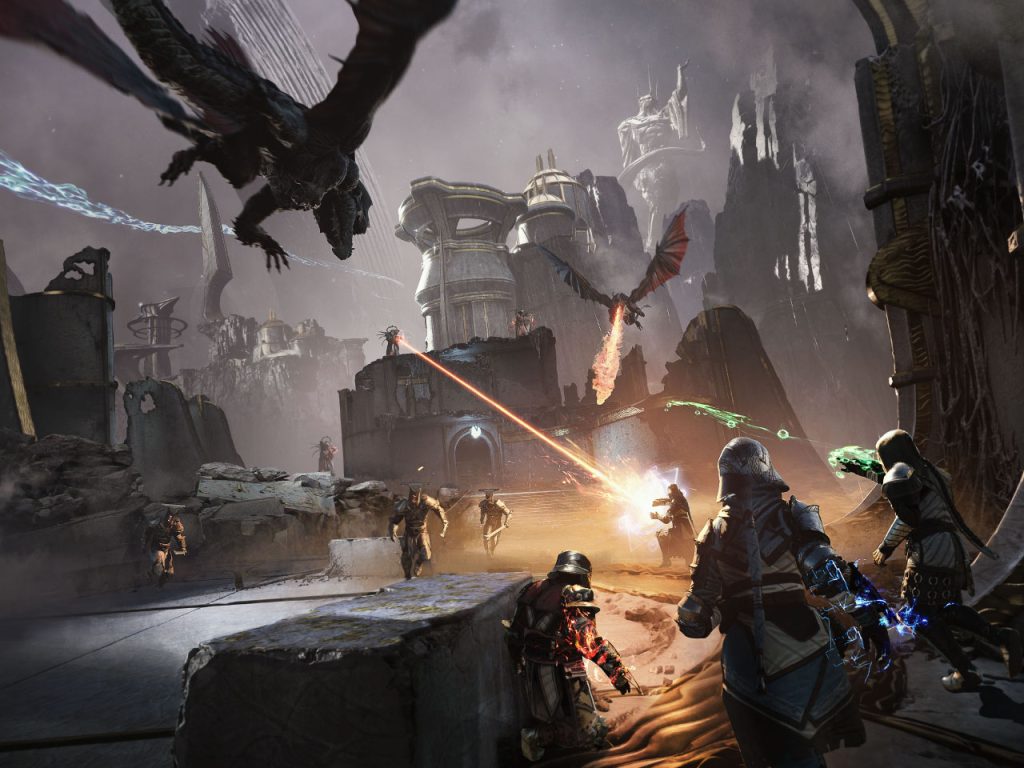Every year, gaming enthusiasts, developers, and other industry professionals gather to chat about all things in the world of the Unreal Engine, a popular and versatile game development platform created by Epic Games and the engine in which we built Immortals of Aveum. As a studio, one of our core values is “Invest in Ourselves.” To us this means encouraging each other to share our knowledge, experience, and insights to help teammates, colleagues, and ourselves continue to grow professionally. Today, we’re honored to do just that during our Unreal Fest 2023 panel,”How Ascendant created a new AAA studio and built a big budget UE5 game from scratch.”
As one of the first fully featured games to be released on the newest iteration of the engine, Unreal Engine 5.1, a few of our veteran AAA devs sat down to chat about Unreal Engine development, converting from UE4 to UE5, the lessons learned, and how our modestly-sized team built Immortals of Aveum – all while navigating a pandemic and adjusting to a remote workstyle.
Take a peek at the panel topics below, then head over to YouTube to get all of the UE development details from the full session with Mark Maratea (CTO), Julia Lichtblau (Associate Art Director), Daniel Chuang (Lead Engineer), Jason Warnke (Lead Combat Designer), and Tyler Sparks (Lead Level Producer).
How did the move to UE5 happen and what was that decision making process like?
Our very own Associate Art Director, Julia Lichtblau, relayed how we used UE5 to bring Immortals of Aveum to life. As the person in charge of environment art, she was thrilled when the team came up with the idea for our Colossal level, but the technical realities of creating it just weren’t adding up in UE4. Luckily, UE5 early access was just opening up in time to see if it could help make Ascendant Studios’ dreams into reality.
What aspects of UE5 improved the art team’s quality of life?
The team went into greater detail on how UE5 changed our development process. Julia spoke on how UE5’s Nanite technology brought unprecedented geometric fidelity and freed our team from using automatic LODs found in previous Unreal versions, but also brought on some challenges with importing old models and even having to redo some to attain the same quality bar across the game.
How did the team take advantage of World Partition and Data Layers?
Our Lead Combat Designer, Jason Warnke, spoke to how World Partition and Nanite handled most of the level design memory management tasks. We also had Daniel Chuang, our Lead Engineer, speak to some of the specifics of the World Partition technology, including how it worked as a ready mechanism to load/unload sets of actors and the power of streaming sources.
What does the future hold for Ascendant Studios?
Our CTO Mark Maraeatea spoke on the future of Ascendant Studios and Immortals of Aveum, including our plan to upgrade the game to Unreal Engine 5.2. He also alluded to another project currently in the works at Ascendant on UE 5.3, but we’ll have more on that in the future.
Stay in touch
Check out more content from our studio! Our original podcast series, Rise Above, delves into the world of video game development through candid conversations with some of the industry’s leading devs who’ve worked on beloved franchises like Borderlands, BioShock, Star Wars, Spider-Man, Dead Space, Telltale’s The Walking Dead, and more. You can also follow us on YouTube, Twitter, TikTok, Instagram, Facebook, and LinkedIn, and subscribe to our newsletter, The Standup to get the latest Immortals of Aveum and Ascendant Studios updates.



